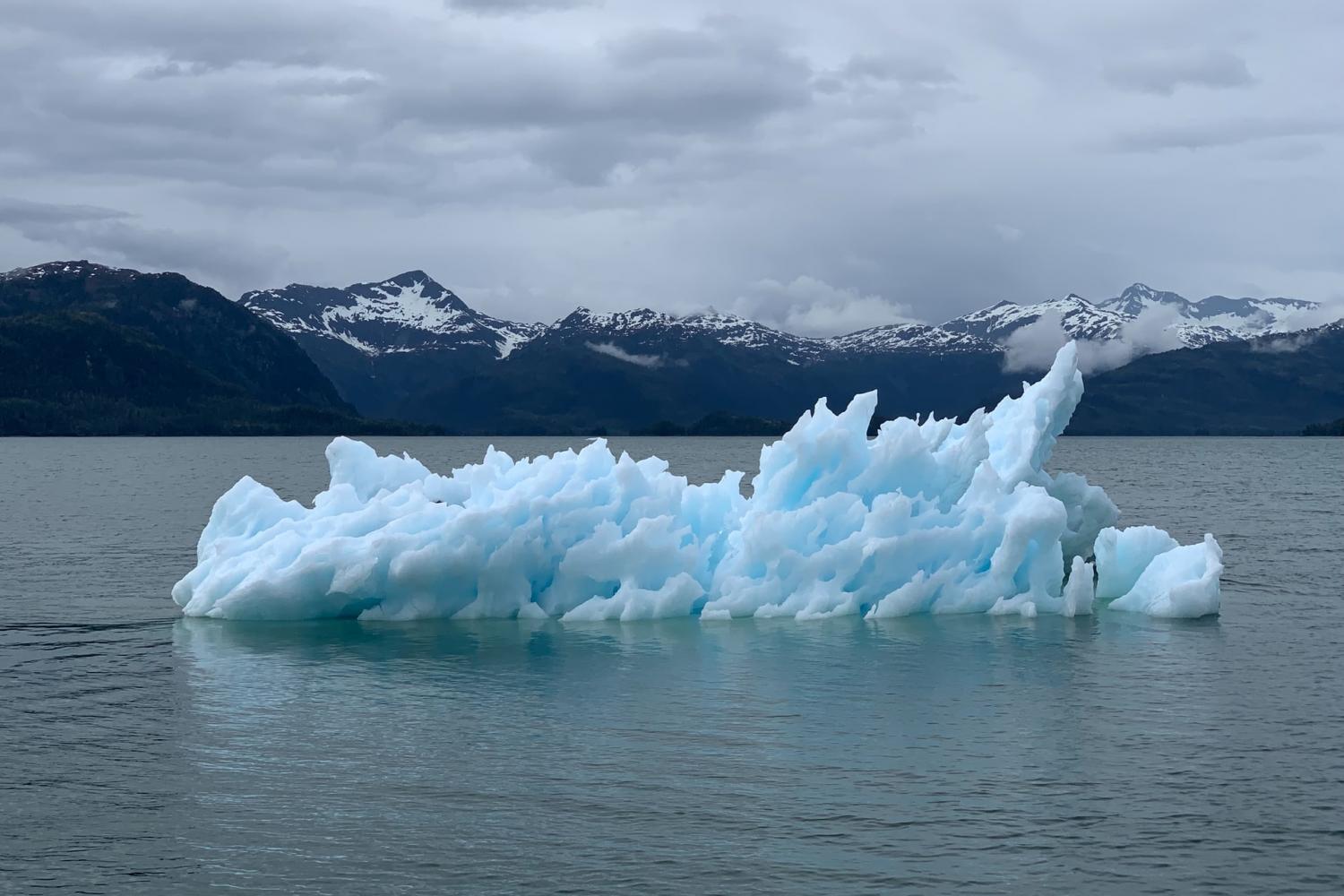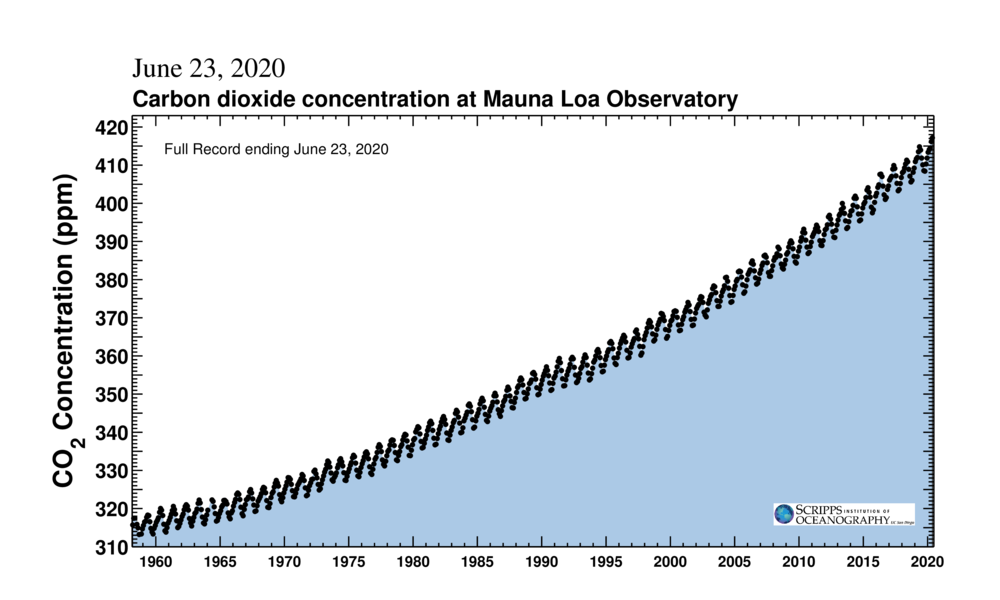
The COVID-19 pandemic has hit the world hard. Not only in lives lost, but in opportunities abandoned and dreams dashed. But in an important but perverse way, the coronavirus has given us a glimpse of a climate-induced normal if global leaders don’t act to prevent a future climate pandemic now.
Much of the world’s economy has been shut down except for those things considered essential to life, what people need eliminating the things they want that make life more enjoyable - traveling, eating out, visiting friends, getting manicures, working out at the gym and attending special events.
The pandemic created only a small diversion from climate change's course
Aerial observations show traditional visual air pollutants have been reduced during the lockdown. Some credible reports say CO2 emissions have been reduced by between 4% and 8%. Despite these improvements, on June 4, 2020, scientists from the Scripps Institution of Oceanography at the University of California San Diego and NOAA announced that “atmospheric carbon dioxide measured at Mauna Loa Observatory reached a monthly peak exceeding 417 parts per million (ppm) in May 2020, the highest monthly total ever recorded.”

Image: CO2 concentration at Mauna Loa Observatory (via Scripps)
The observations at Mauna Loa on the Big Island of Hawaii are considered the global gold standard for measuring the status of carbon dioxide in the atmosphere. “People may be surprised to hear that the response to the coronavirus outbreak hasn’t done more to influence CO2 levels,” said geochemist Ralph Keeling, who runs the Scripps Oceanography CO2 program, “but the buildup of CO2 is a bit like trash in a landfill. As we keep emitting, it keeps piling up. The crisis has slowed emissions, but not enough to show up perceptibly at Mauna Loa. What will matter much more is the trajectory we take coming out of this situation.”
This data tells us that shutting down the “non-essential economy” was not enough to even stall the march of human-caused climate change taking over the planet.
Fossil fuel consumption has still continued unabated
The U.S. Environmental Protection Agency estimates that only 14 percent of annual global emissions are from transportation, the sector that has been primarily shut down in response to the pandemic. Why was transportation hit so hard? Because the public was told to basically stay home. Meanwhile, electricity and heat production (25 percent), industry (21 percent), and agriculture and forestry activities (24 percent) continued to a significant degree. Globally, many these functions are powered by fossil fuels, often using coal to produce electricity and heat.
According to the International Energy Agency (IEA), coal-fired power plants accounted for 30 percent of global CO2 emissions in 2018. The IEA says “the majority of that generation (coal) is found today in Asia, where average plants are only 12 years old, decades younger than their average economic lifetime of around 40 years.”
So what is the answer? A three-phase strategy to urgently replace fossil fuel energy is needed, one that global leaders have been unwilling to address. Instead, they have been skirting around the issue, hoping electric cars, solar and wind installations and conservation can do the trick alone.
First, an international effort to replace all coal plants with clean energy options is critical. It must be done in an urgent manner. Next, the elimination of oil for heating and transportation should be done. Finally, natural gas, the cleanest of the big three fossil fuels, should only be used where it can’t be replaced or is needed to fill gaps in energy produced by clean energy sources like wind and solar or where clean energy storage is not sufficient.
Time to focus on the super pollutants
Concurrently, the reduction of super pollutants, non-carbon greenhouse gases, should be addressed. This can be done administratively with better infrastructure without significant economic harm. The super pollutants researchers often cite include methane, black carbon, nitrous oxide, and chlorofluorocarbons (CFCs) and hydrofluorocarbons (HFCs).
These pollutants could be contributing as much as 50 percent to planetary warming trends. According to Veerabhadran Ramanathan, distinguished professor of atmospheric and climate sciences at the Scripps Institute of Oceanography, "Mitigation of super pollutants is the only way to keep it below 2 degrees [Celsius] by 2050, while we are waiting for the CO2 measures to kick in."
If we don’t urgently eliminate the global use of coal and in phased fashion the other greenhouse gases, the seas will continue to rise, the temperature of the air and the ocean will continue to climb, and the resultant intensity and frequency of damaging storms will continue to increase. As scientists continue to tell us, this will lead to drought, famine, more climate refugees invading regions other than their own, and global strife we have not yet been able to imagine.
Imagine such strife at a global scale, by tens of millions of people uprooted from their homes.
There could be a day when global leaders will become painfully aware that addressing the climate problem is more important than continuing the use of fossil fuels to maintain non-sustainable economic activity. That will result in a new climate/economic normal similar to what the virus pandemic has caused, but worse. Our activities will be limited to what is essential, and those economic generators like tourism, cruise ships, air travel, eating out, and the other pleasures of 21st century life we want will be perceived as wasteful and contributing to a global climate pandemic and human life on the planet.
The only answer is to act before that day comes. To eliminate in rapid fashion the use of fossil fuels in an urgent, strategic, but unrelenting way as described above, starting with coal. This is the only way the pleasures of life today can continue, using clean energy to allow the world economy to prosper, before a global climate lockdown becomes our final hope, just as it did for the coronavirus pandemic.
Editors Note: This piece took first place in the San Diego Press Cub’s 2020 Excellence in Journalism Awards in the environmental category for Online and Daily Newspapers. TriplePundit author Carl Nettleton's submissions to the awards program over the last four years have all been winners, including two major awards, two first place category awards for writing about the environment, one second place for business writing, as well as an honorable mention this year for The Nett Report, his bi-weekly newsletter. There were more than 1,100 entries in multiple categories in the 2020 competition, and the submissions were judged by press clubs in San Francisco, Los Angeles, New Orleans, Rochester (New York), Florida, Cleveland, Orange County, Milwaukee, Tulsa, and Alaska.
Image credit: Melissa Bradley/Unsplash

Carl Nettleton is an acclaimed award-winning writer, speaker and analyst. He heads Nettleton Strategies, a public policy firm specializing in oceans, water, energy, climate, and U.S. Mexico border issues. Carl also founded OpenOceans Global, an NGO solving ocean crises by unifying and empowering global communities. Carl serves on the national and California advisory councils for Environmental Entrepreneurs (E2), a national, nonpartisan group of business owners, investors and others who advocate for policies that are good for the economy and good for the environment. He is co-chair of the San Diego Water Conservation Action Committee (CAC) and a member of the San Diego Regional Chamber of Commerce, Lambda Alpha, South County Economic Development Council, Otay Mesa Chamber of Commerce and U.S.-Mexico Border Philanthropy Partnership.














